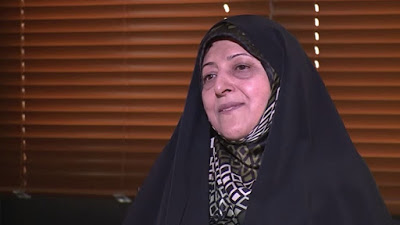Masoumeh Ebtekar: ‘The whole world was against Iran’
 |
| Al Jazeera 23 Mar 2019 |
The Iranian vice president for Women and Family Affairs discusses the principles of the Islamic revolution, 40 years on.
In November 1979, a group of Iranian students took over the United States embassy in Tehran. Fifty-two American diplomats and citizens were held hostage for 444 days, in what became the longest hostage crisis in modern history.
The students were part of a revolution that overthrew the Shah and replaced his government with the Islamic Republic just months earlier.
Any human being reacts to being subjugated to slavery … being subjugated to foreign domination.
Masoumeh Ebtekar, Iranian vice president for Women and Family Affairs
Masoumeh Ebtekar, a prominent figure at the time, was both spokeswoman and translator for the students. Asked by Al Jazeera whether she has any regrets about her involvement with the hostage incident, the Iranian vice president for Women and Family Affairs remains resilient about the intention behind the students’ actions.
“I don’t think any of the students have any regrets because they felt that was a natural reaction. Any human being reacts to being subjugated to slavery … being subjugated to foreign domination. Maybe the only concern or regret that they had was that it could have been resolved quicker,” she says.
The students had demanded the US government deport the Shahback to Iran to stand trial. The hostages were eventually released in January 1981 and the crisis was over – but not Ebtekar’s career.
After years in academia, she became Iran’s third female member of cabinet in its history, when she was appointed as head of the Department of Environment during former President Mohammad Khatami’s government.
Ebtekar has also served as Tehran’s city councilwoman. In August 2017, PresidentHassan Rouhani appointed her vice president for Women and Family Affairs.
Forty years after the Iranian revolution, Ebtekar remains a strong believer of the principles she fought for.
Literacy rates and a younger generation of females encouraged to attend both school and university are badges of improvement and Ebtekar claims that challenges are noted and being systematically addressed.
“On the issue of education, the challenge that we have is that we have not addressed life skills properly in our education system,” says Ebtekar. “This is something that we are focusing on specifically. For example, in the elementary or secondary stages, with the college and university system, we’re working on upgrading communication skills among youth. Upgrading their skills to deal with their citizen rights and critical thought. These are life skills which are very important for the young generation.”
As Iran suffers an ongoing economic crisis and sanctions, “again, on behalf of the United States government”, how long can the Iranian people expect to wait for job creation and a release to the stifling economic pressure?
“Supporting entrepreneurship has been a strategy for us. We have a nationwide project implemented to train young women, particularly women with college degrees, on entrepreneurship skills; 18,000 billion tomans have been given in villages,” says Ebtekar of the Iranian government’s plans to ease economic hardships.
“I think that people have learned how to increase their resilience in difficult times,” she continues. “This nation has withstood a war in which the whole world was practically against Iran when Saddam [Hussein] attacked. They have learned to be patient and to strengthen their internal capacities.”
Asked whether Iran has progressed in the way she had hoped, since the refugee crisis and the start of her public career, Ebtekar is hopeful for the future.
“I think we’ve moved ahead but there is still a long way to go to achieve those sublime goals. We still have a lot to do.”


